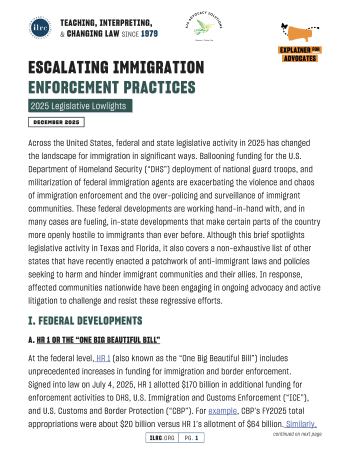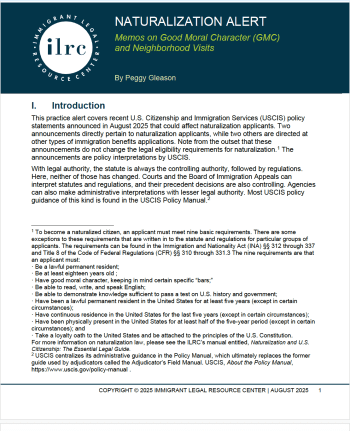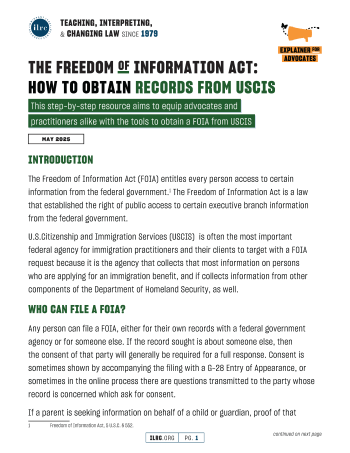The U.S. Department of Justice has issued a new rule that changes how immigration appeals are handled. The new rule shortens the time you have to appeal—which is how you ask for another court to review an unfavorable decision from an immigration judge.
This guide offers practical answers to common questions, so community members can feel more prepared and confident when facing interactions with federal immigration enforcement officials. The guide also highlights specific details concerning Texas and Californian residents.

This brief spotlights legislative activity in Texas and Florida, it also covers a non-exhaustive list of other states that have recently enacted a patchwork of anti-immigrant laws and policies seeking to harm and hinder immigrant communities and their allies.
Information about these agreements and the rights of asylum seekers in immigration court proceedings if the government makes this argument in an immigration court hearing.

This practice alert covers recent U.S. Citizenship and Immigration Services (USCIS) policy statements announced in August 2025 that could affect naturalization applicants.
Recently, the Department of Justice (DOJ) published a memo listing out its priorities for civil enforcement cases. In that memo, the DOJ states that it will be focusing on denaturalization cases. This memo - along with statements made by administration officials and members of congress - has sparked a lot of attention on denaturalization and questions about who could be denaturalized. This has caused a lot of fear and uncertainty in communities, but denaturalization is not as straightforward as you might think.
A resource highlighting interior enforcement practices within the Harris county region of Houston, Texas.
In this Resource Toolkit, we will address recent changes affecting students and school campuses and what students, parents and caregivers, and school administrators can do to prepare for immigration enforcement action at schools while highlighting the constitutional protections that remain a pillar of our democracy.
Community members across the country are reporting visits from immigration and other federal officers seeking to meet with certain children who entered the United States unaccompanied. These children are often referred to as “unaccompanied children” (UCs) because at the time they were arrested by immigration (such as crossing the border), they were not with a parent or legal guardian. Although these visits are sometimes described as “wellness checks,” they are part of a broader, coordinated effort to locate and deport some vulnerable young people and their sponsors. It is crucial for families and immigrant communities to stay informed, exercise their rights, and seek legal support when needed.

The Freedom of Information Act is a law that established the right of public access to certain executive branch information from the federal government. This step-by-step guide helps advocates and community members better understand how to make such requests to attain data about themselves or others from USCIS.